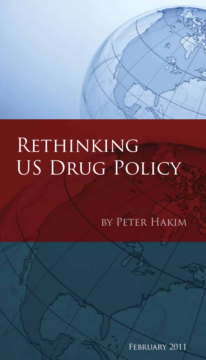
Rethinking US Drug Policy
US citizens today are clearly unhappy with their government’s anti-drug policies.
Neither heavy enforcement nor legalization mark the way forward for drug policy, said experts Mark Kleiman, Jon Caulkins and Angela Hawken. The three authors of the new book Drugs and Drug Policy: What Everyone Needs to Know joined Nobel laureate Tom Schelling at the Inter-American Dialogue on Tuesday to engage in a wide-ranging discussion on the future of drug policy.
All four panelists argued that current US drug policy is not working. Kleiman went so far as to say that “much of what is said and done about drug policy is based on fantasy.”
The authors set out to dispel such fantasies, first by dismantling the traditional drug policy framework “triad” of enforcement, prevention and treatment. The government, argued Caulkins, puts too much stock in prevention programs, which have little effect on drug use. Hawken agreed that many have unrealistic expectations for treatment which is costly, difficult to administer, and subject to high relapse rates.
Countering the established belief that more enforcement is better, Caulkins stressed, “less is more, even though some is vital.” A minimum level of enforcement is necessary to keep drug prices at a high enough level to deter use, but additional enforcement does not affect the drug market.
Caulkins argued further that a “two-tiered toughness” strategy would make enforcement more effective. If police reserve stringent punishment only for the most flagrant and dangerous drug offenders, they can mold the market to be less socially disruptive. Kleiman added that this kind of strategy could be applied in Mexico by focusing police efforts on most violent cartels to curb excessively violent tactics.
On the treatment side, “mandated desistence” offers an alternative method to rehabilitate heavy drug users. Exemplified by the HOPE program in Hawaii, mandated desistance programs curb addiction by trading long incarceration for probationary drug testing. Detected drug use is immediately punishable by short jail sentences. Hawken explained that HOPE dramatically reduces drug use and incarceration at a lower cost than drug courts.
Legalization was not among the panelists’ recommendations. With the potential exception of cannabis, Kleiman declared legalization a “dead end” since any regulated legalization scheme strong enough to shrink consumption would also be strong enough to keep the illegal market alive. A less-regulated legalization scheme would leave the country with a cocaine or heroin problem akin to the alcohol problem it already faces. Both Kleiman and Caulkins found fault with legalization-focused publicity surrounding the recent Global Commission on Drug Policy Report. The report, they argued, focuses on a public health approach to drug policy and does not explore legalization in any meaningful way.
The panelists expressed cautious optimism for the future. Caulkins recognized that the Obama administration, though not as progressive as many had hoped, has taken important steps in the right direction. The panelists agreed that slow progress, rather than dramatic reform, is the best strategy for achieving better drug policy.
US citizens today are clearly unhappy with their government’s anti-drug policies.
Is growing violence in Mexico and elsewhere in Latin America a sign of failures in drug policy? Has the Obama administration made any significant change in anti-drug efforts? What policies should it be pursuing?
Among Latin Americas, there is a growing consensus that the root cause of their violent crime wave is the massive use of narcotics in the US.